“The Ensigns of Command”
Written by Melinda M. Snodgrass
Directed by Cliff Bole
Season 3, Episode 2
Production episode 40273-149
Original air date: October 2, 1989
Stardate: unknown
Captain’s Log: Picard’s attending a string quartet concert that includes Data, O’Brien, Ensign Ortiz, and another crewmember (a Vulcan) and is interrupted by a message from the Sheliak Corporate, who haven’t contacted the Federation in 111 years. They claim there are humans on Tau Cygna V—a neat trick, considering that the world’s atmosphere is filled with hyperonic radiation, which is fatal to humans. The Sheliak instruct the Federation, per the very lengthy and detailed treaty between the two nations, to remove the humans. Tau Cygna V belongs to the Sheliak, so they’re within their rights, and they will exterminate the humans if the Enterprise doesn’t evacuate them.
When the Enterprise arrives at the planet, they detect humanoid life, though sensors can’t determine how many. The hyperonic radiation renders both phasers and transporters inoperative, so Data—as the only crewmember immune to the radiation—must take a shuttle down. He learns that there is a thriving human colony of more than 15,000 people. They are descendants of a colony ship, the Artemis, that was presumed lost 92 years earlier. Instead, they crash-landed on Tau Cygna V after their guidance system failed, and managed to find a way to live with the radiation.

Without transporters, it will take four weeks to evacuate the colony, and the Sheliak has given them three days. Picard attempts to negotiate, but the Sheliak refuse. To make matters worse, Starfleet can’t send a colony transport for another three weeks.
Unfortunately, Data is having a hard time convincing the colonists of the need to evacuate. The colony leader Goshevin insists that the planet is theirs, that they fought too hard to make a world here. They believe that they can fight back. Data’s words are unconvincing. Some of the colonists agree with Data, but most are willing to stand with Goshevin and fight.
Picard takes the Enterprise to find the Sheliak colony ship, which must be nearby if they’re colonizing in two days, in the hopes of negotiating. His concern is that the treaty is 500,000 words long, and the negotiation included 372 Federation legal experts. And, in fact, Picard’s attempts to explain the situation and ask for an extension of the deadline fail rather spectacularly.
Data realizes that, since words have failed, he’ll have to try actions. He uses his own circuitry to modify a hand phaser so that it will work in the hyperonic radiation and attacks the aqueduct, stunning several colonists on the way. The damage he does has an immediate effect. He is one android with one weapon, and he could reduce the pumping station to nothing—the Sheliak will wipe them out from orbit. (It is, after all, the only way to be sure.)
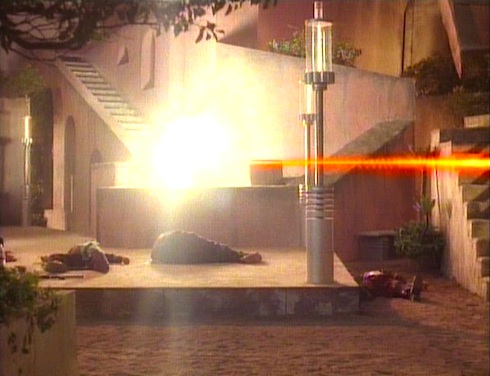
Poring over the treaty, Picard finds a paragraph that can help him. He contacts the Sheliak and requires third-party arbitration of their dispute. The Sheliak grudgingly admit that he has that right, and then Picard nominates the Grizzelas to serve as arbitrators. However, they’re in their hibernation cycle, and won’t be out of it for another six months, at which point, the whole thing can be settled. Picard gives them a choice—wait six months for the Grizzelas, or give him the three weeks he needs for the colony ship to arrive. The Sheliak refuse at first, at which point Picard declares the treaty in abeyance. That’s enough to get the Sheliak on board, and they give Picard the three weeks.
Can’t We Just Reverse the Polarity?: La Forge, O’Brien, and Wes work for three days on trying to get the transporter to function in the radiation. At the end of the episode, La Forge happily announces that it can be done—and it’ll take 15 years and a team of specialists. Picard sagely suggests that they postpone.
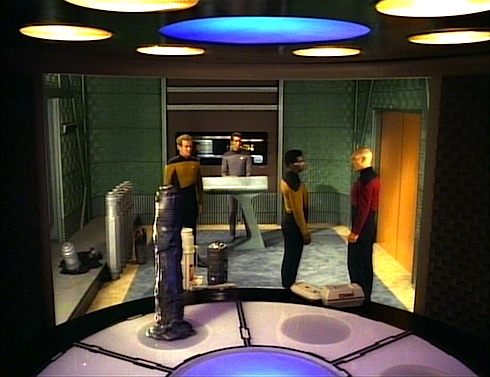
Thank You, Counselor Obvious: Troi has a wonderful scene where she demonstrates to Picard how difficult it is for people to communicate without a common language.
If I Only Had a Brain : Data, last seen playing the violin as Sherlock Holmes in “Elementary, Dear Data,” is now part of a string quartet. His violin playing would continue to be a recurring motif throughout the series (notably in “Sarek” later this season). He also gets to work on using reverse psychology and improvisation.
Of particular note is the fact that Data uses a part from his right arm to modify the phaser. From that moment forward, Brent Spiner never uses his right arm, letting it hang uselessly at his side, a nice touch.
No Sex, Please, We’re Starfleet: Ard’rian McKenzie, the colonist who is most receptive to Data’s cause, totally flirts with Data and he totally doesn’t appreciate it.
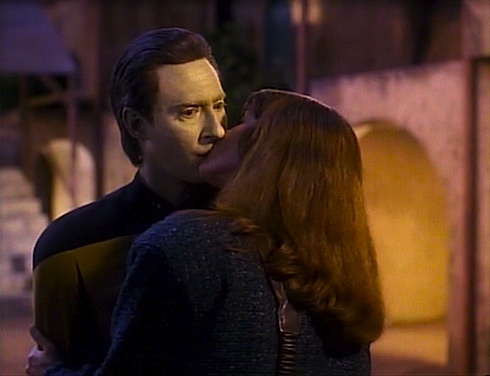
Welcome Aboard: Eileen Seeley is incredibly charming as Ard’rian. Richard Allen and veteran character actor Mark L. Taylor do fine as two other colonists. Grainger Hines was so unhappy with how his performance as Goshevin turned out that he took his name off the credits and insisted his voice be dubbed by another actor. Colm Meaney appears as O’Brien, but doesn’t have a word of dialogue.
I Believe I Said That: “He wants the impossible.”
“That’s the short definition of ‘captain.'”
Wes in response to Picard’s insistence on them making the transporters work, and La Forge’s retort.
Trivial Matters: This was actually the first episode of the third season filmed, but “Evolution,” while filmed second, was written as the season premiere.
The episode’s title is pretty dreadful, but it does at least have a nifty literary source: John Quincy Adams’s poem “The Wants of Man.”
This is the only time O’Brien is seen playing the cello, though it will be mentioned again, most notably in the Deep Space Nine episode “Shadowplay.”
The 14th Dalai Lama visited the set during the filming of this episode.
Data’s shuttle is the Onizuka, named after Ellison Onizuka, one of the astronauts who died on the space shuttle Challenger in 1986.
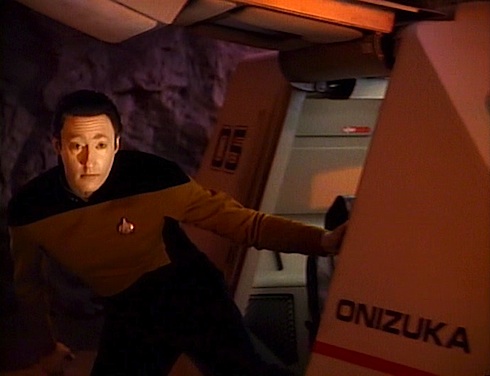
Make it So: “Who’ll be left to bury you?” I have always liked this episode. I know that plenty of people don’t, and the complaint I’ve heard most often is that the colonists are too stupid to live. Well, I spent two years working public service at the New York Public Library, another two years working for the U.S. Census Bureau, and I currently work at a high school, and I can assure you that, in fact, most people are that stupid. In fact, a lot of them are stupider. That Census work also exposed me to quite a bit of bureaucratic nonsense, which made the Sheliak scenes resonate as well. So this episode rang just right for me on every level.
Also, it does a wonderful job of turning expectations on their ear. Picard uses the Sheliak’s own bureaucracy against them in a magnificently clever turn—the bit where he cuts the Sheliak off and keeps them waiting for an answer is classic, and Sir Patrick Stewart plays it briliantly—and the miracle workers actually don’t fix the transporter.
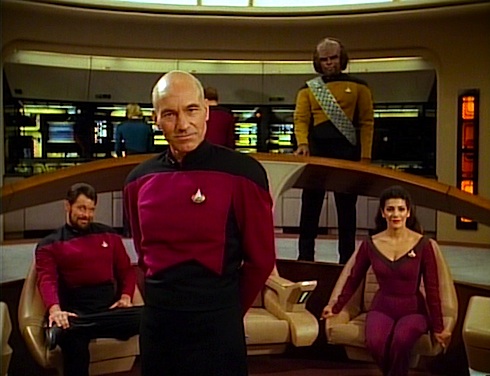
On top of that, it’s a wonderful showcase for Data, who gets a true command situation, since he’s literally the only person who can accomplish his mission, and it proves more difficult than expected.
Just a wonderful episode.
Warp factor rating: 7
Keith R.A. DeCandido‘s first ever Star Trek fiction was the comic book Perchance to Dream, which will be reprinted later this month by IDW in the trade paperback Enemy Unseen. His most recent critically acclaimed novels are Guilt in Innocence, part of “Tales from the Scattered Earth,” a shared-world science fiction concept, and the fantastical police procedurals SCPD: The Case of the Claw and Unicorn Precinct. Find out more about Keith at this web site, which is a portal to (among many other things) his Facebook page, his Twitter feed, his blog, and his podcasts, Dead Kitchen Radio, The Chronic Rift, and the Parsec Award-winning HG World.










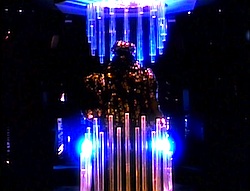
I always liked this episode as well. Data does an excellent job when given a task that seems impossible.
I too liked this episode. It’s not the greatest one they did, but it does have its moments.
I never noticed that bit about Data’s arm hanging useless from his shoulder. I’ll have to look for that.
— Michael A. Burstein
I’m surprised we’ve never had a novel or story about first contact with the Sheliak, and the eventual creation of the treaty. Given the 2255 time frame, I imagine Sarek and other TOS Ambassadors (Fox? Hedford?) being among the negotiators, and maybe Pike or Matt Decker making first contact.
This episode always bothered me for the way it solidified what became a permanent change in how Data was portrayed. Originally, the intent was that Data had the capacity for emotion, but it was undeveloped and limited. He showed definite signs of emotion in episodes like “The Naked Now” and “Skin of Evil.” By the second season, it was sometimes implied that emotion was rare for him (e.g. “The Schizoid Man”), but I think “The Ensigns of Command” was the first time he overtly came out and said he had no emotions at all, and the first time that lack of emotion was really made a big deal of, treated as a defining trait of his character. And I always hated that about his characterization. It’s foolish to claim that emotions are harder to program in an AI than intelligence. Emotions are the closest thing we have to programming — they’re inbuilt, automatic responses to stimuli. By themselves, as in animals, they’re rather simple and predictable. It’s their interaction with intelligent thought that makes them complicated, like when people’s desires clash with their beliefs or obligations. So it should be far easier to give an AI emotions or the equivalent than to give it consciousness. The “emotionless robot” notion is a silly sci-fi cliche and I always regretted seeing it descend on Data. And this was the episode where it was first made blatant. The Data here, who’s completely uncomprehending when Ard’rian kisses him, is not the same Data who talked to Tasha about being “fully functional” exactly two seasons earlier.
The Sheliak were cool, though. We could’ve used more such truly alien cultures in modern Trek, the kind of weird nonhumanoids that were paradoxically more common in TOS. The concept was better than the execution, however.
This is definitely a good episode, by the standards of TNG up to this point — great conflict and suspense really help it dramatically — but some of the scenes with Data and the colonists are just painful. KRAD’s point that people really are that stupid is well taken, but the acting just seems bad and the dialogue contrived.
I love episodes where Data has to get creative. He normally functions by collecting and analyzing information — inspiration is something he is incapable of, on paper at least. Episodes like this one, “The Most Toys” and “Redemption, Part 2,” are great because you really get to see the character develop towards humanity. I wish the TNG writers had been more deliberate about showing this ability develop — all through the show he seems to be on a plateau where he doubts his ability to be creative at first, and then he succeeds brilliantly. You would think that eventually he would become a little more confident.
I never noticed Data’s arm either. One thing I love about TNG actors is that there’s always something new to discover in their performance, 20 years later.
This one’s pretty good, though I find the obvious dubbing of the colony leader’s lines kind of distracting. And man, is the “the whole population of the planet seems to be about 20 extras” thing ever on display here. They got better at hiding that in later seasons when the production values went up a bit.
Thanks for the observation about the arm; I’ll look for that.
Sure, the colonists came off as a bit silly, but given that this decision was tied up with their self-identity and their motivating traditions, it’s not that hard to believe that people would be irrational about it. I actually liked the overall conflict that embodied. I also liked that both A and B stories resolved their problems with realistic cleverness rather than techno-babble. I think it was essential that the transporter team not succeed.
So, I agree that the ep was a bit clunky at times, but I’ve always enjoyed it. An accurate rating, I’d say.
Sheliaks are asexual, doughy blobs created by Federick Pohl, to me.
The title always makes me think the episode is “Lower Decks”.
http://www.youtube.com/watch?v=iYCjqmbsmYA
Crowning Moment of Awesome and Crowning Moment of Funny all rolled into one. For that alone the rating of 7 is well deserved.
It’s enjoyable to see how transporter problems translate 75+ years after Classic Trek, especially on the flagship of the Federation. Episodes like this and “The Enemy” and “Power Play” are always interesting to me, as we see how advancements in technology don’t always allow for ease of transport.
I don’t think it necessarily translates into ’emotion,’ per say, but I like when Data goes from his typical carefree state into a more forceful, commanding presence (as he does later in “Chain of Command”), showing that his leadership training paid off…and that’d he be a great first officer. And even though it’s a simple trick, I always enjoyed the exploding water lines at the end of the episode. Pursuant to Paragraph 145, sub-section B-7, I name this a great review, krad.
(BTW, does anything exist of Hines’ original dialog?)
By the way, a bit of astronomical trivia: Sheliak is the proper name for Beta Lyrae, the binary star system where the TAS episode “The Slaver Weapon” (and the Known Space novella it was adapted from) took place. It was an uninhabited system in that episode/novella, and is quite unlikely to support life (since it consists of blue giant stars that would be very short-lived in astronomical terms). Perhaps the Sheliak are from the vicinity of Beta Lyrae rather than the system itself, and the Federation calls them that because Beta Lyrae is in their space.
@8: The title isn’t using “Ensigns” in the sense of “the lowest-ranking naval officers,” but in its earlier sense of “badges or tokens of office.” See the John Quincy Adams poem that Keith linked to above:
“I want the seals of power and place,
The ensigns of command…”
So the ensigns of command are the trappings that identify you as a leader, that prove your rightful authority. The title symbolizes Data learning to assert and exercise his authority as the mission commander, demonstrating to the colonists that he should be followed.
How wonderfully smug are the crew in the last still :D
Admittedly a good episode, but just how many colonists were on the original ship? First it crashed, probably killing some, then they had to learn to live with the radiation, which had to kill a lot more. And yet a mere 92 years later, not much more than a lifetime in the Federation, there are 15,000 of them!? I know they needed a sufficiently large number that bringing everybody up via shuttle would take a long time, but they must have bred like rabbits.
DemetriosX: My guess is that the Artemis had hundreds of thousands of people on board. Maybe millions.
@11- Thank you, but I did know all of that.
This episode changed quite substantially from Snodgrass’s original script and original intent. She has posted the original version as a PDF on her website.
It’s definitely worth taking a look.
As much as they state (repeatedly) that Data has no emotions, it always seemed to me that from Season 3 onward, there would be faint sparks of emotion playing under the surface. I assumed that Data did have the capacity for emotion, but he just didn’t realize it. And, in fact, he was already experiencing them in understated ways — I mean, how can you have friends if you truly have no emotions at all? When they gave him the emotion chip in the movies it felt like short-cutting the character’s evolution.
@17 I never thought of it as short-cutting it, so much, as…
I don’t know. It seems kinda like giving a very hard-of-hearing person a cochlear implant. It was awful, when it was inflicted on him, but when it was a choice he made for himself? It is an interesting, and at times poignant, thing to be able to perceive clearly and identify better something that was always kinda there.
I agree that Data always had some muted ability to feel emotions. His problem was that he was so sternly told that he couldn’t, possibly on a firmare level, that would make it hard for him to reconsider even in the face of such overwhelming evidence. And everyone else took his word for it, even while subconsciously treating him the opposite.
I always saw his confusion in this ep as, not so much he was incapable of attraction, he just wasn’t attracted to *her*. And that could be terribly confusing for a Data who thinks he can’t feel the emotion that would make the point obvious. “Why was I interested in copulating with the one girl who threw herself at me, and not the other?” Especially when, you know even for Data, there wasn’t much time for deep thinking on the subject. Brent Spiner did such a lovely job of making it obvious that Data was considering things he never talked about, and it makes me sure that Data considered this issue at length.
If he didn’t have some grounding in these questions, he couldn’t’ve dealt so well with Madame Borg.
(But I’m a right proper Trek fan, and overthink and justify things all over the place.)
Hmmmm….no new episode today? :(
Chessara: belated apologies for being late both last week and this week. Life got in the way on two straight Wednesdays. I’m going to try to use the break next Thursday (we’ll be skipping Thanksgiving, so “Booby-Trap” will be Monday the 21st, with nothing Thursday the 24th, and then “The Enemy” on the 28th) to get a bit ahead so this won’t happen again.
—Keith R.A. DeCandido
“Troi has a wonderful scene where she demonstrates to Picard how
difficult it is for people to communicate without a common language.”
Which seemed misplaced. Communication with the Shelliac is convoluted at worst. This scene would have worked much better in “Darmok.”
@@.-@ I don’t think the intent was to suggest that Data didn’t have emotions because they were too difficult to program. After all his prototype Lore had them in abudnance. In “Brothers” Soong tells Lore that with all the complexities of his programming emotions seemed simple by comparison. But since Lore turned out to be a sociopath he constructed Data to specifically NOT have emotions until he could work out how to avoid the same result. I always took the hints of emotional behavior Data exhibited before getting the chip in Star Trek: Generations to be either deliberately affected (as in “Reunion II”) or a sort of emergent property that Soong didn’t anticipate.
You’re probably right that both the writers and Brent Spiner conceived the character differently the first two years which I think is why he’s portrayed so oddly at times – particularly in the first season. And I’ve always detested that the intoxicant virus affects him in “The Naked Now” with no (even by Trek standards) remotely plausible explanation.
This is the episode that made my friends and me say “Whoa! Now THIS is Trek!”
I definitely always took for granted that Data had the capability for rudimentary feelings… like when he says his circuits get used to someone’s presence when Tasha dies… it’s obvious he has some basic emotional ability.
@13 and @14: The original colony wouldn’t have needed to be very large at all. In 92 years, assuming the original colonists were all young adults and ready to start breeding, 4 generations could have occurred. If each couple had 6 children (which is a pretty conservative estimate for people trying to populate a planet), and assuming another generation every 30 years (also a conservative estimate), a surviving founding population of only 100 couples would result in a 4th-generation population of over 20,000 individuals, even if everyone from the first couple of generations had died.
Listen to the opening classical music, as the camera pushes in toward Dr. Crusher, you can hear what sounds like a close approximation of the theme song. Nice trivial.
Just a note on his right arm: Data uses his right arm when he kisses Ard’rian towards the end of the episode. The left is obscured, but he seems to be taking her in both arms.
I always liked the fact that the episode didn’t resort to a typical technobabble solution. A weaker episode would’ve had them workaround the transporter problem at the last minute or reconfigure some system to generate some new kind of particle. Instead, both Data and Captain Picard had to think and negotiate their way out of the situation, which is something that I would’ve liked to have seen more often.
I have to agree with comment #4; Data, often a delight, is stiff and boring here. I also think it’s a little uncharitable toward the colonists’ leader. He’s making the wrong decision but the script acts as if his sentiment for the sacrifices and accomplishments of his ancestors is completely foolish. Conversely I dislike the glib and blase reaction of Ard’rian to the idea of leaving everything behind. At least Kentor wanted to know what life would be like after evacuation before he was willing to support it.
I liked the fake-out regarding the Sheliak’s alien nature; at first it seems like they reject Picard’s appeal for flexibility because of basic differences in worldview but when the Sheliak captain is immediately willing to negotiate when Picard uses the treaty against him it turns out they were just being jerks all along.
Another nice thing about this episode is the inverted A and B stories. One is a very logical character having to appeal to emotional people while the other is a man being emotional while trying to deal with extremely logical people.
That does lead to a few flaws, though. While it’s dramatically enjoyable to see Data doing something Picard would find easy while Picard does something Data would find easy, it’s frustrating in some ways. Data could instantly have scanned the treaty for any advantageous clauses. He could have been asked to do that while on his other mission. Also it feels very forced how no one from the Enterprise helps Data at all. Picard could give him some good tips. It’s odd to see Riker be pretty hostile to Data when he asks for advice.
It feels like what should have happened is Data dealt with the treaty problem while Picard dealt with the colonists. Surely Crusher could’ve created some anti-radiation medicine. They should also definitely have hazmat suits. As I said, the role reversal type thing is great but I don’t think they sold it very well – it felt too contrived and had Data basically being abandoned and almost forgotten about.
This episode is slowly becoming one of my favourites. The performances are excellent across the board and the story just damn enjoyable. The Sheliak ship interior reminds me of Arra’s ship in the Space:1999 episode “Collision Course”. If I had to nitpick one thing, it would be the cheap set used for the planet surface.
Richard Allen and Mark L. Taylor I thought were very wooden in the begging, but their performances improved.
I did enjoy this episode, but I didn’t like how Data was portrayed in terms of his leadership skills. As a Lieutenant Commander, I find it impossible to believe at that point in his career he was oblivious to excessive honesty being a detriment to subordinates’ trust in a leader.
Thierafhal: that’s a perpetual problem with how Data was written. His entire character journey in TNG was written as if he’d had absolutely no experiences prior to “Encounter at Farpoint,” despite having gone through the Academy and then progressed to the rank of lieutenant commander.
—Keith R.A. DeCandido
@32/Thierafhal & 33/krad: That inconsistency in Data’s writing was something I tried to address in my TNG prequel novel The Buried Age. I posited that most people in Starfleet had been uneasy with Data, so they’d shunted him into posts where he had little interaction with other people, and he just accepted that. It was Picard who first encouraged him to assert his own wishes more and seek more career advancement and interaction, and that was my explanation for why they were so close.
Really, though, Spock had the same problem. He was constantly written as finding human behavior bewildering and alien, even though he’d grown up with a human mother and served for 11 years with the mostly human crew of Pike’s Enterprise.
Christopher: That’s actually a clever retcon for Data.
I don’t know what to do about Spock, though. *laughs*
—Keith R.A. DeCandido
@35/krad: Aren’t there many people who find others’ emotions baffling, even here and now? If Vulcans teach their children to suppress emotion, Spock wasn’t encouraged to understand others’ emotional reactions, he was encouraged to keep his distance and not think about them too closely (or at all).
One of the differences between Spock and Data is that Data, unlike Spock, wants to be more human and actually studies his collegues’ behaviour.
@36/Jana: Yes, and people on the autism spectrum often have trouble understanding other people’s figurative speech or emotional expression, no matter how much experience they have with it. Sometimes they don’t even use contractions. If you interpret Data or Spock as autistic or neuroatypical, their difficulty with emotions, idioms, and the like makes much more sense — and the insistence of other characters (or Data’s own ambition) that they should be “more human” has aged very badly, because it’s equating “neurotypical” with “human.”
Now, I myself … I have to word this precisely … my last psychologist diagnosed me with Asperger’s Syndrome, but completely forgot to write it down before my dad’s insurance ran out. Truthfully I like the changed name to Autistic Spectrum Disorder because it feels like I really AM ‘a little autistic’. Anyway, I certainly have the empathy deficit, and that’s why my favorite character to watch is Data. THAT and I think he’s left-handed, which is another little quirk of mine. (Apparently Brent Spiner is, mostly, so Data is, mostly. I was thrown by him playing guitar righty in that one episode. If I were on Twitter I’d type #LONGAside right here…)
But I just sympathize with his failures to ‘read’ people, because I feel the same way ALWAYS. One of my jobs basically ended because I had no idea how to explain away a panicked face that looked JUST like an eyeroll to a guest. At my current job I’m intentionally the Comically Serious because I have no idea if anyone would get ANY of my jokes. You know, stuff like that.
Still, I do have some thoughts on his emotional capabilities. Sometimes I feel like my emotions are just a little bit misshapen based on ‘normal’ people, and that’s basically what my assumption is with Data. He was artificially stunted emotionally, and yet we still see it coming through, just … differently.
A good “Star Trek” episode. Feels a bit stale to me though, unlike later season 3 episodes. Perhaps it’s the production values. I did notice how Goshevin’s lines were dubbed but never knew before that it was because the actor was so unhappy with his performance. But I always did feel like it was wooden. Richard Allen would go on to portray the Tamarian first officer in “Darmok.” Eileen Seeley’s performance was cute and charming.
I thought the Sheliak were very interesting and would be a great race to bring back on another series. I always appreciate non-humanoid aliens on the show and their strict adherence to contracts is an interesting feature.
Now for maybe an odd observation to bring up but it was blatantly obvious to me, perhaps because I was watching in on high-definition blu-ray, is that in the scene of Troi and Picard on the Sheliak ship, Troi is displaying a severe case of camel toe in her uniform. I’m not sure how common that is in costuming for women, but you’d think between the actress, the director, the costumer, and various other people on set and in post-production, that that kind of thing would be noticed. Or maybe no one cared? I just found it interesting, and like I said, very obvious.
I love how these Rewatch pages seem to live on, with this one now into its 10th year of periodic comments.
I watched this one with my daughter last night, and I had remembered it from when I was her age 11, and have rewatched many times since then. It is a wonderful 40-something minute piece of Star Trek where the good guys have limited time and resources to save innocent lives, the bad guys don’t care and are ready to exterminate them, and one of the characters has to expand him/herself beyond their comfort zone to save the day. Throw in some generally friendly but generic space colonists, a nice looking little town square set with a cool aqueduct, a shortsighted A-hole colony leader, and some really interesting, really alien aliens and this is a very enjoyable episode.
It has been said above, but let me add my voice to the ranks of those who are sad the Sheliak never came back onscreen in any other Trek incarnations. They were unique and loathsome enough the really present something different for our heroes to handle. Picard couldn’t just moralize his way out of this problem. I wonder why no writer in the years since ever successfully picked up this wonderful thread? I was even more shocked when I checked on Memory Beta and saw that they don’t appear in any licensed fiction either! KRAD/CLB there’s your cue.
The Sheliak are interesting enough that I’ve always remembered them but continually forget which episode they come from.
Lastly, as a lawyer, I happen to love it when the solution to the problem is buried in some forgotten section of a century-old legal document. Welcome to my world!
PS: “I am afraid I have no time to answer a million questions” is absolute comedy gold from Data.
Great trek! It’s interesting to me how current events and age affect how you view these things. When if first saw this episode I was 13 and didn’t understand how there could possibly be a question for the colonists to evacuate. At one point Data recited some figures of the breakdown of a survey and a sizable contingent “refused to believe” in a threat.
And now here we are in a world where a good amount of the population refuses to acknowledge a factual truth…and you realize that when people’s views of themselves depend on believing a lie, they will believe it with every fiber of their being!
Brilliant episode. The A, B and C stories all work really well. I like that they weren’t able to figure out the transporter issue. The idea of Picard working on one end of the problem while Data works desperately on the other end of it really popped for me. Data’s speach after blowing up the aquifer is also extremely good writing. I also agree with the poster above me. The refusals of the colonists to engage with reality even when their lives are literally on the line strikes me as a lot more realistic than it did the first time I watched this episode. People can absolutely be their own worst enemies.
In a more realistic world, Picard would have multiple staff members going through the treaty with a fine-toothed comb, instead of just going through itself. For all the increased crew capacity, TNG tends to act more like only the crew portrayed by the actors in the credits are actually working.
Just rewatched this one again.
One of the funniest things I’ve noticed this time around; EVERY TIME Picard tries to give another Ultimate Picard Speech, the Sheliac just hang up on him (or beam him back to his ship.)
“Between species of good will…”
“Ahhh shaddap ya windbag.”
@38/wizardofwoz77: “Truthfully I like the changed name to Autistic Spectrum Disorder because it feels like I really AM ‘a little autistic’.”
Very belated response, but the “spectrum” isn’t meant to be a scale of “more” to “less” autistic. That’s not a spectrum, that’s shades of a single color. The autistic spectrum is called that because there are many different behavioral traits that characterize autism, and every different autistic person has a different mixture of traits, just as every chemical element has a different mix of colors in its emission spectrum. And our society associates some of those traits more strongly than others with conventional views of autism (such as the assumption that it can only be an impairment), hence the perception that some people are “only a little” autistic, when they’re really just autistic in different ways.
Or here it is explained in comic strip form: https://the-art-of-autism.com/understanding-the-spectrum-a-comic-strip-explanation/
This was such a great find. I just watched this episode again and was trying to find out if the word Deanna uses in that scene actually means something in some language when I found this page. I love these conversations and as someone else said, it’s great to know we can still keep discovering things about Star Trek all these years later.
Goshevin’s instantaneous transformation from inflexible jackwagon to mopey realist was jarring and unconvincing. But I’m OK with the high rating, because Picard sauntering over to the Enterprise’s nameplate and checking it for dust while he made the Sheliaks cool their heels was worth 5 points all by itself.
#39 why on earth would you need to even point that out, so gross and creepy
@48: While that is certainly your opinion, I don’t think remarking on what I think is a fashion faux pas as “so gross and creepy.” There are whole TV shows dedicated to being critical of celebrities’ fashion choices and often they are brutally honest. Like I said, I had never seen something so obvious in someone’s costuming on a dramatic TV show so I was surprised that wasn’t fixed before air. I’m not sexually objectifying or degrading the actress at all, just making an observation. If Patrick Stewart was sporting an obvious erection while wearing his bathing suit in “Captain’s Holiday” I’d make a remark on that too.
Let’s move on–not sure this debate is adding anything constructive to the conversation about the episode in question, and as noted, there are other places to discuss fashion/costume mishaps that are not this site. Thanks.
I was watching the extended version of “The Measure of a Man” yesterday along with the audio commentary that was recorded for it by writer Melinda Snodgrass. Since she was also the writer of this particular episode, she delved into it a little bit and mentioned that it mostly represented her vision. However, a major break with what she had written into the screenplay was that Brent Spiner objected to the portrayal of Data as written as “too emotional.” And apparently he won out too, to Snodgrass’ displeasure, which is unusual in itself since most actors don’t have the power or leverage to change the lines they’re supposed to read. But the whole incident is notable in itself because Snodgrass, like some others, was also of the belief that Data was actually capable of feeling emotions. Therefore, it was Spiner’s direct influence as of this episode that solidified that Data had no emotions at all (until implantation of the emotion chip, or if you count that brief moment when Q had Data experience what it felt like to laugh).
@45 Even more belated thank you for that comic. I seriously need to save that one for myself and for my Special Education teacher sister. I really did feel like it was oversimplification on my part and thus my psychologist’s part.
“Troi has a wonderful scene where she demonstrates to Picard how difficult it is for people to communicate without a common language.”
I remember this episode better than most. And yet I didn’t quite recall that it has three of my favorite moments in all of TNG — if not all of Star Trek, period. One is the above, which I actually thought was from “Darmok”, proving EnsignJayburd’s comment @21 on the exchange in question being more appropriate to that story.
The other two are Picard’s triumphant moment in his dialogue with the Sheliak, just the absolute greatest scene, and his brief visit to the transporter room with Geordi’s “About like you’d expect, sir.” I conjure up the latter often amidst the vicissitudes of life.
As with Rootboy @6, I find the dubbing of Goshevin’s dialogue immensely distracting.
Rewatching and this has to be the voice of Magneto from X-Men.
“Grainger Hines was so unhappy with how his performance as Goshevin turned out that he took his name off the credits and insisted his voice be dubbed by another actor.”
If you mean the ’90s animated X-Men, it was David Hemblen who played Magneto. I know Hemblen’s voice quite well, and though I can hear why you think there’s a resemblance, that’s definitely not Hemblen doing Gosheven. It’s unlikely that an actor based in Canada would’ve been hired to dub a Hollywood production anyway.